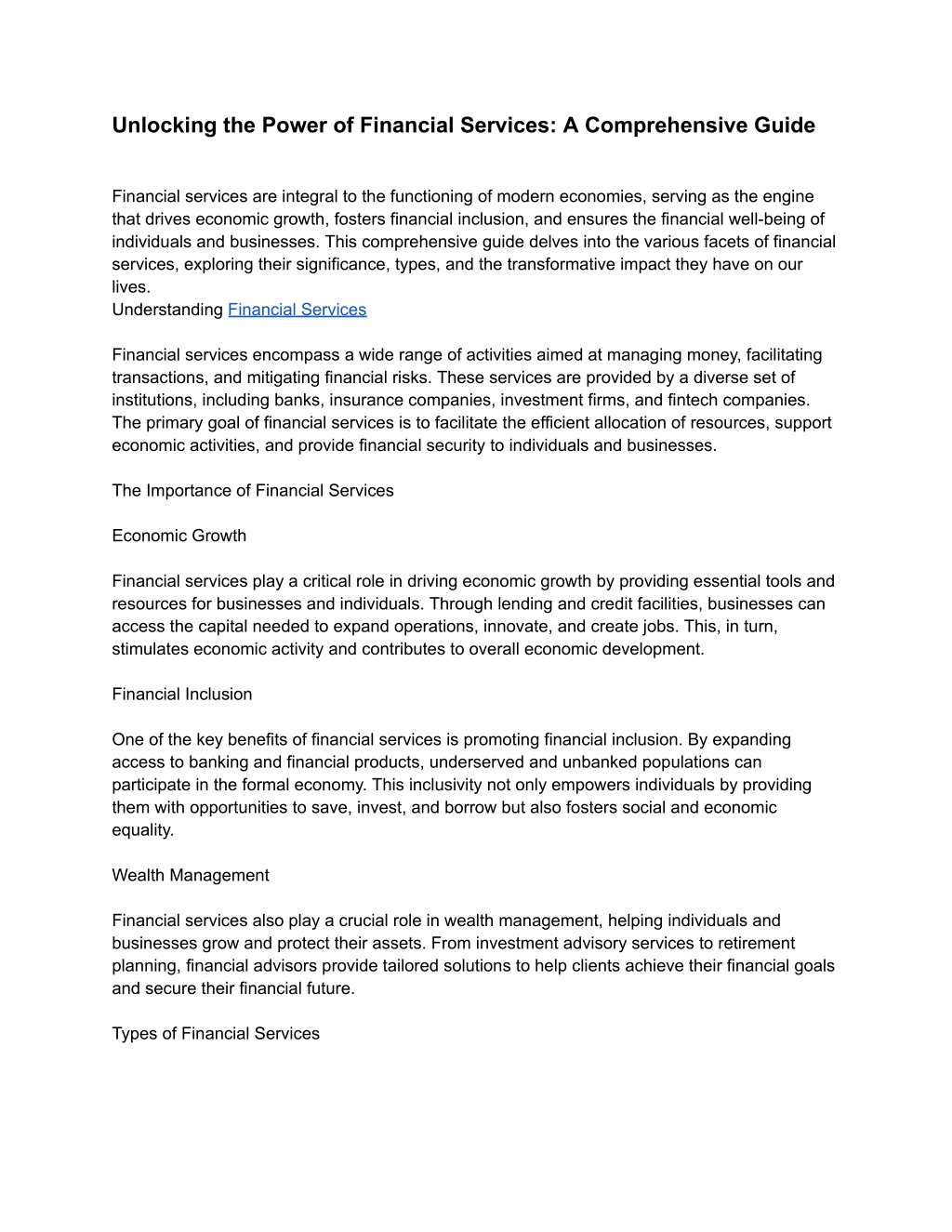
Unlocking the Power of Financial Services_ A Comprehensive Guide
nFinancial services are integral to the functioning of modern economies, serving as the engine that drives economic growth, fosters financial inclusion, and ensures the financial well-being of individuals and businesses. This comprehensive guide delves into the various facets of financial services, exploring their significance, types, and the transformative impact they have on our lives.n
Uploaded on | 0 Views
Download Presentation
Please find below an Image/Link to download the presentation.
The content on the website is provided AS IS for your information and personal use only. It may not be sold, licensed, or shared on other websites without obtaining consent from the author. Download presentation by click this link. If you encounter any issues during the download, it is possible that the publisher has removed the file from their server.
Presentation Transcript
Unlocking the Power of Financial Services: A Comprehensive Guide Financial services are integral to the functioning of modern economies, serving as the engine that drives economic growth, fosters financial inclusion, and ensures the financial well-being of individuals and businesses. This comprehensive guide delves into the various facets of financial services, exploring their significance, types, and the transformative impact they have on our lives. Understanding Financial Services Financial services encompass a wide range of activities aimed at managing money, facilitating transactions, and mitigating financial risks. These services are provided by a diverse set of institutions, including banks, insurance companies, investment firms, and fintech companies. The primary goal of financial services is to facilitate the efficient allocation of resources, support economic activities, and provide financial security to individuals and businesses. The Importance of Financial Services Economic Growth Financial services play a critical role in driving economic growth by providing essential tools and resources for businesses and individuals. Through lending and credit facilities, businesses can access the capital needed to expand operations, innovate, and create jobs. This, in turn, stimulates economic activity and contributes to overall economic development. Financial Inclusion One of the key benefits of financial services is promoting financial inclusion. By expanding access to banking and financial products, underserved and unbanked populations can participate in the formal economy. This inclusivity not only empowers individuals by providing them with opportunities to save, invest, and borrow but also fosters social and economic equality. Wealth Management Financial services also play a crucial role in wealth management, helping individuals and businesses grow and protect their assets. From investment advisory services to retirement planning, financial advisors provide tailored solutions to help clients achieve their financial goals and secure their financial future. Types of Financial Services
The realm of financial services is vast, encompassing a wide array of products and solutions designed to meet the diverse needs of consumers and businesses. Some of the key types of financial services include: Banking Services Banking services form the cornerstone of the financial system, providing essential functions such as deposit-taking, lending, and payment processing. Common banking services include: Checking and Savings Accounts: Providing a secure place for individuals and businesses to deposit their funds. Loans and Mortgages: Offering credit facilities to support personal and business financial needs. Credit Cards: Providing a convenient method of payment and short-term credit. Investment Services Investment services help individuals and businesses grow their wealth through various asset classes. Key investment services include: Brokerage Accounts: Facilitating the buying and selling of securities such as stocks, bonds, and mutual funds. Investment Advisory: Offering professional advice and portfolio management to optimize investment returns. Retirement Accounts: Helping individuals save and invest for retirement through accounts like 401(k)s and IRAs. Insurance Services Insurance services provide financial protection against unforeseen events, offering peace of mind and security. Key types of insurance include: Life Insurance: Providing financial support to beneficiaries in the event of the policyholder's death. Health Insurance: Covering medical expenses and promoting access to healthcare. Property and Casualty Insurance: Protecting against losses related to property damage or liability claims. Retirement Planning Services Retirement planning services assist individuals in preparing for their financial needs during retirement. These services include: Retirement Savings Plans: Offering tax-advantaged savings options to build retirement funds. Annuities: Providing a steady stream of income during retirement.
Pension Plans: Ensuring a defined benefit upon retirement, typically offered by employers. The Role of Technology in Financial Services Advancements in technology have revolutionized the financial services industry, making it more efficient, accessible, and user-friendly. Key technological innovations include: Digital Banking Digital banking platforms enable customers to manage their finances online, offering convenience and flexibility. Customers can perform transactions, monitor account activity, and access a wide range of banking services from their computers or mobile devices. Fintech Innovations Fintech companies leverage technology to disrupt traditional financial services, offering innovative solutions for payments, lending, investing, and personal finance management. These innovations enhance the customer experience and make financial services more accessible to a broader audience. Blockchain and Cryptocurrency Blockchain technology and cryptocurrencies like Bitcoin and Ethereum are redefining the financial landscape. Blockchain offers a secure, decentralized ledger for recording transactions, while cryptocurrencies provide an alternative to traditional currency and payment systems. Artificial Intelligence and Machine Learning Artificial intelligence (AI) and machine learning are transforming financial services by automating processes, enhancing risk management, and personalizing customer experiences. AI-driven tools can analyze vast amounts of data to provide insights, detect fraud, and optimize investment strategies. Challenges and Opportunities While financial services offer numerous benefits, they also face significant challenges. Key challenges include: Regulatory Compliance Financial services are heavily regulated to ensure stability, integrity, and consumer protection. Navigating complex regulatory environments can be challenging for financial institutions, requiring significant resources and expertise.
Cybersecurity Threats As financial services become increasingly digital, cybersecurity threats pose significant risks. Financial institutions must implement robust security measures to protect sensitive data and prevent cyberattacks. Financial Literacy A lack of financial literacy can prevent individuals from making informed decisions about their finances. Financial institutions and advisors play a crucial role in educating clients and promoting financial literacy. Despite these challenges, the financial services industry also presents numerous opportunities for growth and innovation. By embracing technological advancements, expanding access to underserved populations, and developing new financial products and services, the industry can continue to evolve and thrive. Conclusion Financial services are the lifeblood of modern economies, providing essential tools and resources for managing money, facilitating transactions, and mitigating financial risks. By understanding the various types of financial services and the role of technology in shaping the industry, individuals and businesses can unlock new opportunities and achieve their financial goals. As the financial landscape continues to evolve, staying informed and seeking professional guidance will be key to navigating the complexities of the financial world.






























![Financial hardship and the economic burden of health [cancer] care](/thumb/779/financial-hardship-and-the-economic-burden-of-health-cancer-care.jpg)

















